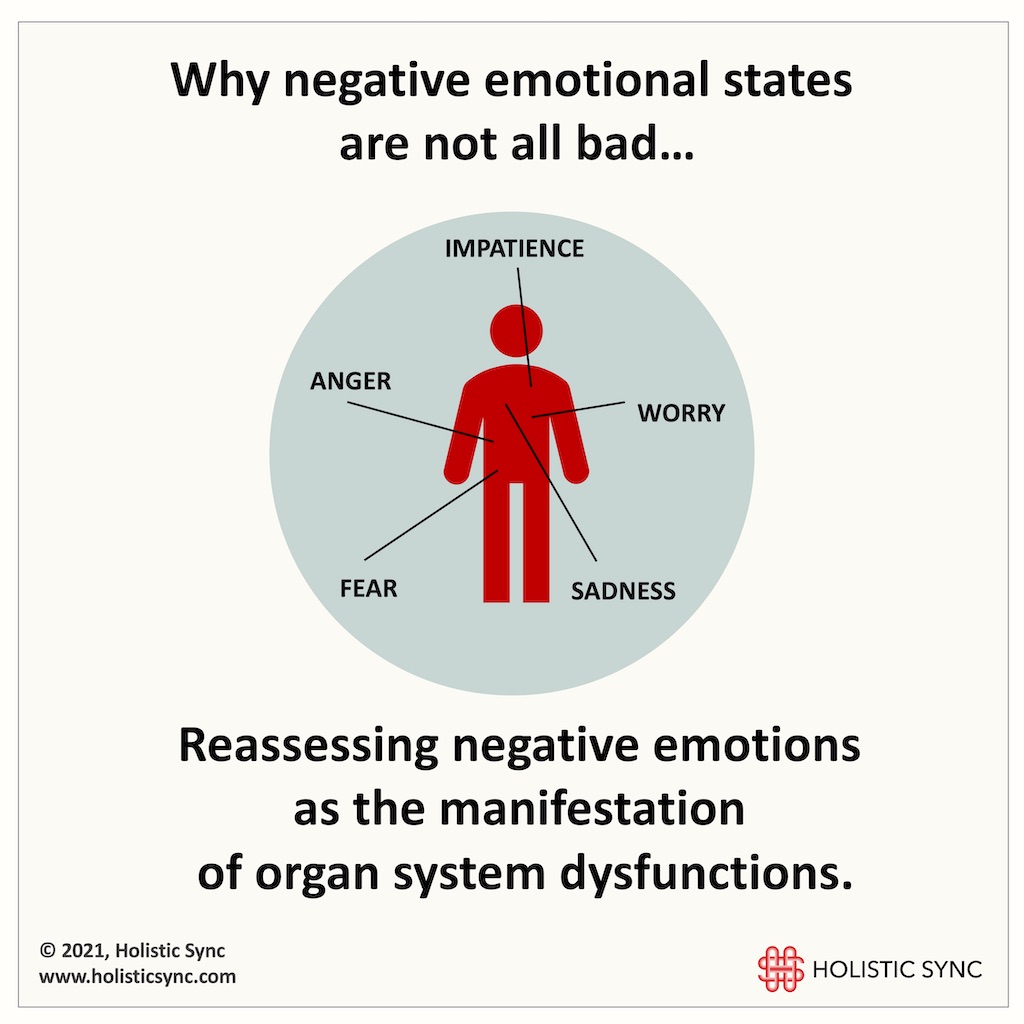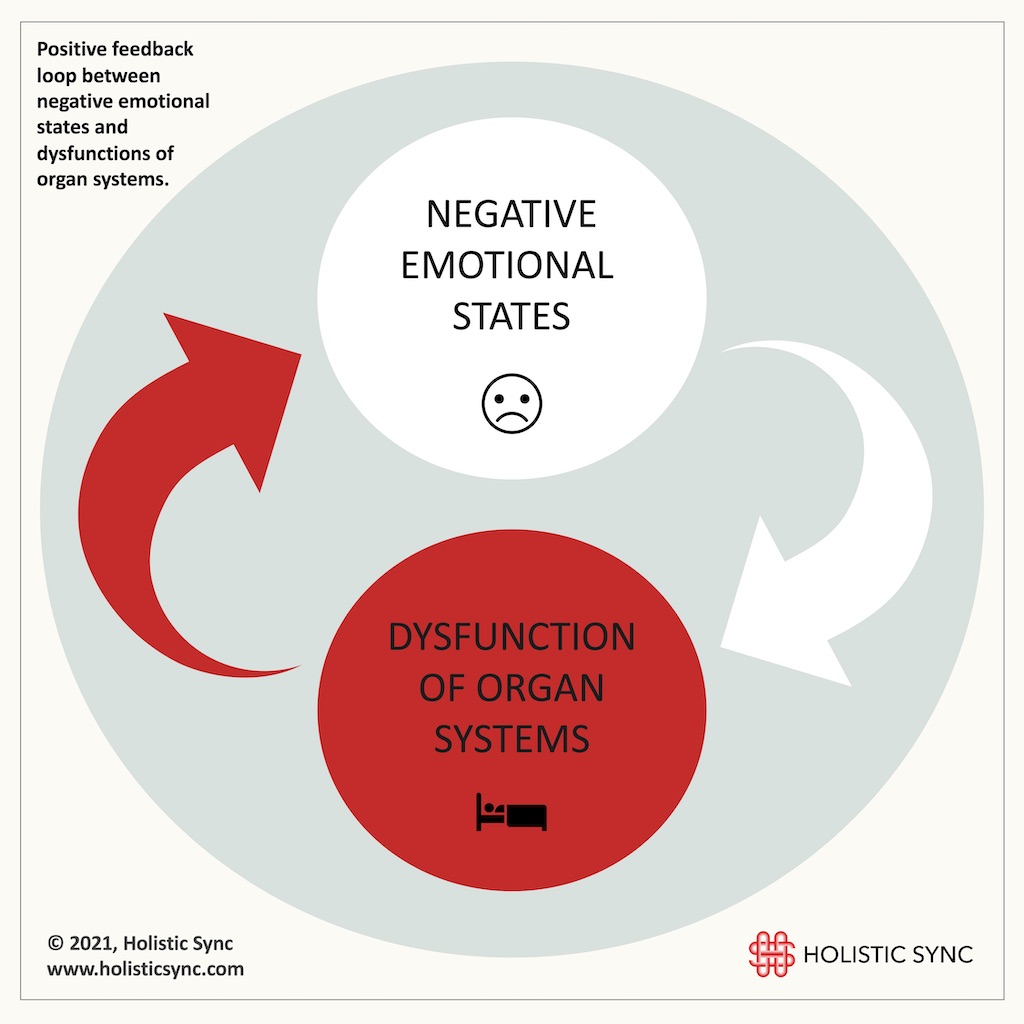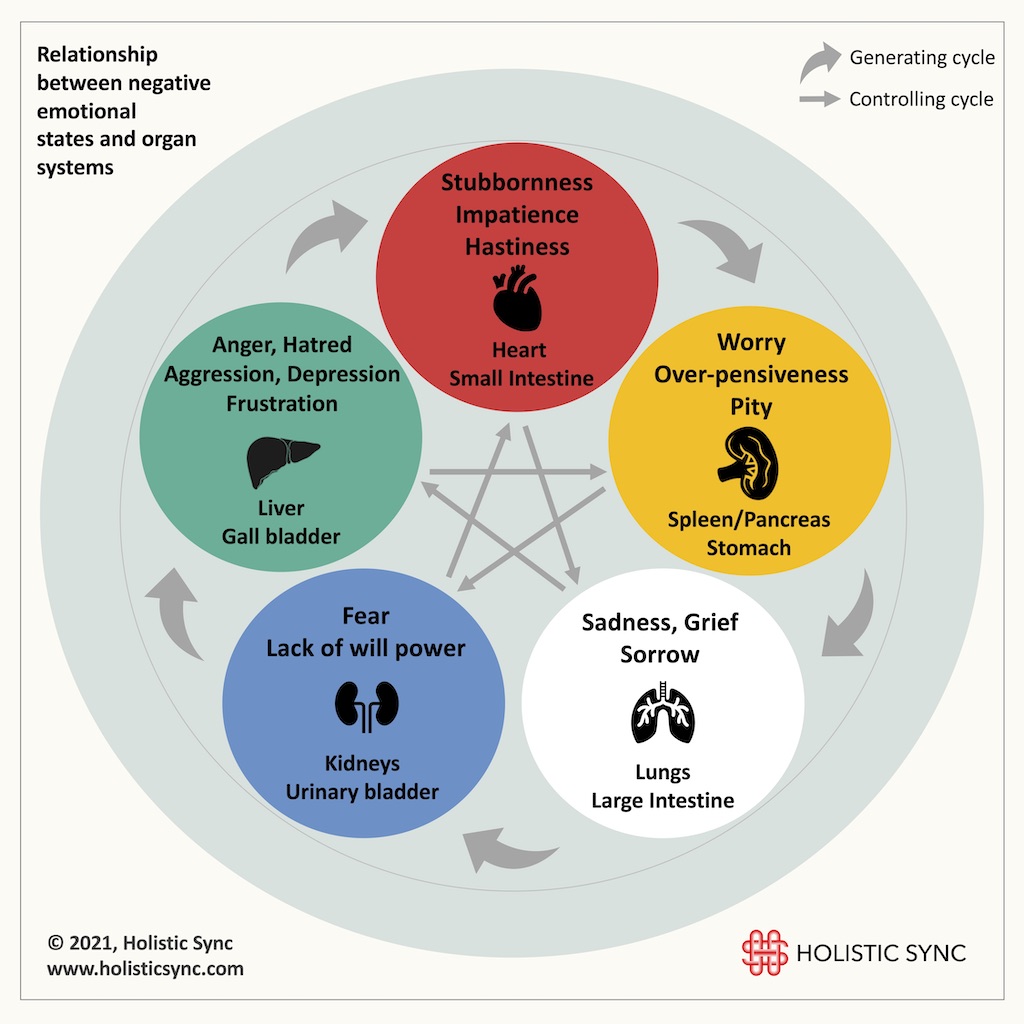- Negative Emotions, Emotional Health, Mental Health, Dysfunction of Organ Systems
Why negative emotional states are not all bad…

Author: Dr. Andréa Fuzimoto

Disclosure: This site contains links to our store. Some others may be affiliate links by which we may earn a small commission when you purchase certain products or services. This does not affect the prices that you may pay for them. By purchasing from us you help support this website and our services. Thank you!
Negative emotions as the manifestation of internal organ system dysfunctions provides a key “assessment” guidance to improving emotional and organic health.
According to Daoist meditative practices, negative emotional states could be interpreted as “powerful driving forces that are often “mis-channeled”. This might “sound” strange to some people. However, If you have ever experienced any episode in your life when you felt a lot of anger and yet you were able to use that driving energy to accomplish something positive, you know what I am talking about. For example, when well directed, frustration and anger can make people tune in the altruism inside of them and fight for social justice in pacific street demonstrations. Perhaps you were challenged by someone who said that you could not perform a job. The irritability that you felt fueled your desire to prove yourself and you ended up exceeding in performing that job. Maybe someone instilled so much fear in you that despite feeling frozen in space and time, you gathered the courage and the will to overcome your sense of restriction.
However, don’t take me wrong. Negative emotions are very toxic to our internal organs and our relationships. The majority of us do not know how to transform them into positive and nourishing driving energy. Often, we are driven by negative emotions that may linger for many years and that may get in the way of our personal growth. Other times, we find ways to coexist and somehow use their energy to accomplish something even though they may not be attained in the best possible way nor the results be exactly what we wanted. Unlike “Darth Vader” who draws his power from the “dark side of the force” through surrendering to anger, rage, and fear, we want to transform negative emotions into positive patterns. This way, we can pull energy from much higher and constructive emotional frequencies and choose paths that reflect these “higher” states.
Negative emotions and organ system dysfunctions

For our internal organs to properly function, they need a good production and circulation of blood, fluids, and proper energetic metabolism. If there is a functional problem with the organs or their circulation, it creates blockages that may manifest as inflammation and pain, and it can also trigger emotional responses. Our internal organs when unbalanced can generate negative emotions but negative emotions can also affect the function of the organ systems. The medical model of Traditional Chinese Medicine (TCM) is particularly useful to understand emotional patterns, their association with the functions of organ systems, and their holistic integration.
A liver that is toxic, stagnant, or inflamed can generate a sensation of frustration, anger, or depression. On the other hand, the negative emotional states associated with the liver can also contribute to this organ being further stagnant influencing how it does its job such as detoxification, assistance in digestion, synthesis of proteins, bile production, and other functions. This can create a positive feedback loop in which negative emotions reinforce the dysfunction of the organ systems, and vice-versa. Many people may say, “oh, I have emotional problems but my internal organs are fine. I just came back from an annual checkup and my labs are all good”. Well, negative emotional states can sometimes be the only sign of functional imbalances of the organ systems. Sometimes they are the “tip of the iceberg” that can predict that dysfunctions or more crystalized organic problems may evolve in the future. Transforming the negative emotions into positive emotional patterns may assist in the improvement of the organ system dysfunctions and diseases.
Constitution and the correspondence between emotions and organ systems
Each one of us is born with a constitutional makeup with different functional levels of the organ systems that reveal our weaknesses and strengths. For example, some people are born with the propensity to develop type 2 diabetes. If they take good care of themselves through good nutrition, stress management, and routine exercises, they may not develop diabetes. Other people have really strong digestive systems and feel that they can eat whatever they want without ever experiencing major consequences. Likewise, we are also born with weaknesses and strengths regarding the expression and the management capacity of emotions. You may know people who have experienced anger issues all their lives and have to be in therapy for anger management. Other people have deep-seated fear problems which hinder the ability to develop their potentials. In another example, some people are enthusiastic about developing new ideas and they are always initiating projects, but never finishing them. These emotional patterns that can be present during a person’s whole life are associated with the internal organ systems.

Relationship between negative emotional states and organ systems according to Traditional Chinese Medicine (TCM).
Anger, frustration, inability to plan and execute ideas, and incapacity to channel creative energy into projects belong to an unbalanced or diseased liver and gall bladder. Fear and lack of willpower are associated with the dysfunctional levels of the kidneys and urinary bladder. Sadness and grief pertain to the lungs and large intestines not working properly. Being constantly worried and feeling self-pity is related to the poor functional level or organic problems of the spleen/pancreas and stomach. Impatience, unsettledness, arrogance, and stubbornness are linked to the heart and small intestines. However, it is important to note that certain emotional states may be associated with more complex organs systems’ interactions. Anxiety, for example, may have heart, kidney, liver, and other organ system components. The irritability, mood swings, and the feeling of not being even-keeled in pre-menstrual syndrome (PMS) in women are often related to liver dysfunction. Additionally, the organ systems are interconnected in a way that each one influences the others.
In the so-called “generating” cycle, the organ systems “nourish” each other in a clockwise direction. If there is a functional deficiency of one organ system it can affect the one being nourished. For example, a lack of willpower due to weak functional kidneys may lead to poor planning skills of the liver and weak decision-making of the gall bladder. In contrast, in the “controlling” cycle, the organ systems “balance” each other out. If there is a functional excess in one organ, it may affect the one that is controlled. For instance, anger and irritability related to the liver may deplete the function of the spleen/stomach and generate or increase a state of being worried and over-pensiveness. The organ systems and their emotions interact in many different ways and create interdependent patterns.
Additional factors influencing emotional patterns
At this point, you may be thinking that things are not as simple as having a correspondence between emotions and organ systems. If you are asking yourself this question, you are right. In fact, life events and adverse circumstances can create multilayered complex scenarios that can make things challenging. That can include traumatic events, troubled childhood, relationship issues, divorces, loss of loved ones, abuses, and financial problems, just to cite a few examples. Chronic diseases and age can impact the functional level of organ systems and reflect in the emotional patterns as well. Social and educational values and patterns can also be big influencers in one’s life. Fear, for example, can be “contagious’ in a way that a child living with members of a family who are fearful of everything can also develop the same pattern.
However, constitutional aspects that we are born with make each one of us face and deal with these scenarios differently. We all have constitutional assets and limitations that make us respond to life events better or worse. I am sure you can identify among your friends, family, or yourself, people who are fearless and determined, or those that are extremely calm under pressure. For some people, no matter what life throws at them, they seem to always land on their feet. The emotional strengths we are born with support us. However, understanding our constitutional makeup and recognizing where our limitations come from is where we can undergo substantial growth.
Scientific research on emotions and diseases
Now that you have a better understanding of the relationship between emotions and diseases and functional levels of organ systems according to TCM/Holistic Medicine, let us see how science is getting to similar conclusions. For instance, one study stated that the occurrence of depression is higher in patients with liver diseases such as chronic hepatitis, alcoholic liver disease, and non-alcoholic fatty liver when compared with the general population.1 Indeed, depression is often attributed to a pattern that we call “liver qi stagnation” in TCM, and this can also be combined with patterns of disharmony in other organ systems. In another study, 71 patients with lung cancer undergoing radiotherapy and chemotherapy were interviewed for their emotional patterns and behavioral aspects.2 Overall, when considering their emotions, 23 patients (44%) expressed feelings of sadness, 15 (29%) voiced fear, 9 (17%) shock, and 4 (8%) guilt.2 Due to a complex disease such as lung cancer, multiple factors can influence one’s health and were also investigated (e.g. lifestyle, family relationships, psychological, and behavior determinants). Nonetheless, as we have seen, the main negative emotion pertaining to the lungs is sadness which was the prevalent emotion reported by patients.
Another noteworthy research area is the potential relationship between personalities and cardiovascular diseases (CVDs). The type A personality is a person who is outgoing, pro-active, competitive, anxious, hostile, and impatient while the type B personality is more relaxed, calm, flexible, and empathic. Several studies investigated the behavior of the Type A personality as a risk factor for developing heart diseases. As we saw, impatience, one of the marked traits of the type A behavior, belongs to the TCM concept of heart. Interestingly, several studies suggested a strong link between Type A behavior and CVDs, and one research correlated the type A personality to impatience and increased heart rate variability upon the performance of certain tasks.3,4 However, due to dissimilar results of some studies and the discovery that negative affectivity was also associated with CVDs, the studies shifted to examine the role of anger and hostility in CVDs.3 The studies demonstrated that hostility and anger were significantly associated with increased coronary heart disease (CHD).3 Understandably, by a holistic interpretation, we can see that anger-hostility (belonging to an unbalanced liver) can fuel up and incite the heart and cause an inflammatory response.
Then, the investigations evolved to evaluate CVDs and other possible risk factors and emotional triggers such as the type D or “distressed” personality. The type D personality is characterized by negative affectivity (e.g. worry, irritability, sadness, gloom, pessimist) and social inhibition (e.g. low-self-stim and confidence, fear of rejection,).3 The type D behavior has been associated with greater cortisol reactivity to stress which implies that adrenal glands/kidneys organ system of TCM is also implicated.5 Thus, in this example, the heart could be affected due to its relationship to different organ systems such as the kidneys and liver. Regardless, the important takeaway is that all the organ systems and the emotions associated with them are interconnected.
Some of us may think of negative emotional states and behaviors as our flaws or faults, and some of them can generate guilt or shame. For example, jealousy, irritability, lack of willpower, fear, lack of discipline, impatience, arrogance, authoritarianism, procrastination, weak planning ability, or poor decision making may make us feel bad about ourselves. However, they may happen due to our inability to deal with our inherited patterns or they may be related to dysfunctional organ systems or diseases. Negative emotional patterns are key symptoms to unlocking internal organ system dysfunctions. Also, emotional patterns are part of our “emotional” constitutional makeup which determines our strengths and weaknesses in responding to life events and diseases. Thus, recognizing our emotional patterns helps us identify where we need to work to improve our health and social interactions. Now that you understand a little bit more about the TCM-holistic emotional physiology, you can explore your emotional traits and how they interact to contribute to health or dysfunctions.

Dr. Andréa Fuzimoto, DAOM, MSTCM, MSCS, CSAS, Dipl. O.M (NCCAOM®/USA), L.Ac. (CA/USA); PT/Acu (BR) is a clinician and researcher working with Holistic Integrative Medicine (HIM) with emphasis in gastrointestinal, neurological, and immunological conditions. Patients look for her careful diagnostic evaluation, strategic treatment planning, and compassionate care. As a researcher, she is a peer-reviewed published author and a Elsevier certified peer-reviewer contributing to different scientific journals. She has trained and worked in centers of excellence such as the Stanford University Medical School (Pain Medicine Division) with NIH-funded Clinical Trials, and the California Pacific Medical Center (CPMC), at the Stroke Clinic, among others. For more information on her specialties and certifications, visit Linkedin.
References
- Huang X, Liu X, Yu Y. Depression and Chronic Liver Diseases: Are There Shared Underlying Mechanisms? Front Mol Neurosci. 2017;(10:134). doi:https://doi.org/10.3389/fnmol.2017.00134
- Ginsburg M, Quirt C, Ginsburg A, MacKillop W. Psychiatric illness and psychosocial concerns of patients with newly diagnosed lung cancer. CMAJ. 1995;(152(5):701-8). https://pubmed.ncbi.nlm.nih.gov/7882232/
- Sahoo S, Padhy S, Padhee B, Singla N, Sarkar S. Role of personality in cardiovascular diseases: An issue that needs to be focused too! Indian Heart J. 2018;Vol. 30, supplement 3:Pages S471-S477. doi:https://doi.org/10.1016/j.ihj.2018.11.003
- Jennings J, Choi S. Type A components and psychophysiological responses to an attention-demanding performance task. Psychosom Med. 1981;(43(6):476-87). doi:https://doi.org/10.1097/00006842-198112000-00004
- Sher L. Type D personality: the heart, stress, and cortisol. QJM. 2005;(98(5):323-9). doi:https://doi.org/10.1093/qjmed/hci064
